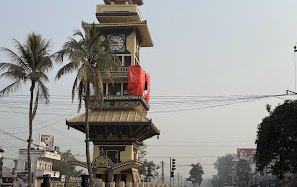Currently
more than 65 million people are forcibly displaced globally, 24 people per
minute, caused by extreme poverty, food insecurity, human trafficking, ethnic
cleansing, disasters, war, ongoing conflict or persecution. There are 3m asylum
seekers, 21m refugees and 41m internally displaced people around the world, of
which 52% are children in developing countries.
Everyone has the right to life and liberty. Like all human beings, refugees and displaced persons enjoy human rights that are articulated by international human rights instruments. Just like everyone else, refugees shouldn’t have to face discrimination.
Since vast majority of refugees and displaced live in the developing countries, it is a challenge for these countries to manage protracted crisis. The presence of refugees and displaced, and demands on the already severely strained economy, services and infrastructure add to the extreme hardship affecting the local populations.
Despite the fact that Nepal has not acceded to the 1951 Convention or the 1967 Protocol relating to the Status of Refugees, nor has it developed national legal frameworks and procedures relating to refugee protection, Nepal hosts a large number of refugees and asylum seekers, mainly from Bhutan.
Development Cooperation Policy, 2014 of the Government of Nepal states, “Humanitarian aid will be mobilized to respond to incidences, such as natural disaster, epidemic, food insecurity and malnutrition, conflict and refugee management. The management of humanitarian aid will be as per the established international principles.”
Refugees are amongst the furthest behind groups in the society. In view of the Sustainable Development Goals, leaving no one behind, the generosity of Nepal and the host communities, and development cooperation policy are very helpful to include refugees in humanitarian response. To be meaningful, linking humanitarian response and development is needed for the self-reliance and resilience of refugees and the host community.
Based on the studies in different parts of the world, refugees can bring knowledge, skills and assets to the hosting area. The question is how can we enable refugees to work with the host community to contribute to the local economy beyond the care and maintenance. Building local capacity of both communities into mutual cooperation is critical for the local economy.
On World Refugee Day, held every year on June 20th, we commemorate the strength, courage and perseverance of millions of refugees. Let us treat refugees with dignity!
- Reclaiming Nepal’s Budget From Hidden Hands
- Jun 07, 2025
- Redefining Regional Cooperation: How SAARC can evolve like ASEAN
- May 11, 2025
- From Nepal to Myanmar: Navigating Earthquake Response Lessons
- Apr 13, 2025
- World Humanitarian Day 2024: Committing to Peace and Accountability
- Aug 19, 2024
- Nepal Investment Summit: Unlocking Economic Potentials For Growth And Development
- Apr 28, 2024
















